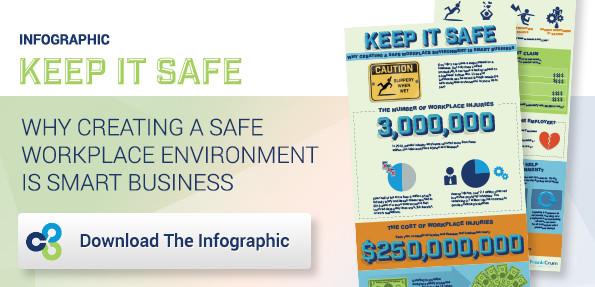.jpg?width=300&name=image%20(56).jpg)
Workers’ compensation costs aren’t reflected simply by the cost of insurance premiums. The biggest factor of cost associated with workers’ compensation is the cost of actual workplace accidents. Between lost time, medical costs, attorney fees, and business disruption, even a relatively minor workplace accident can be costly and time-consuming. And to make a bad situation worse, once you’ve had workplace accidents and/or safety violations, your insurance premiums will most likely rise.
To stay off that slippery slope, here are five things you can do to reduce your workers’ compensation costs across the board.
1. Have good training and sustainable safety practices
Training is the foundation for safe work practices. Prioritize training related to your specific industry, especially for management. Know all of the OSHA regulations and any others that apply to your business, and make it management’s highest priority to train, role-play, coach, and retrain your staff often. To jumpstart this process or simply improve it, consider a safety audit.
2. Maintain the right attitude toward safety and your employees
If you look at safety as a choice that’s expensive and time-consuming, then it will be, because accidents will occur and the expenses will mount. But if you start with the genuine desire to attract high-quality employees who know what they’re doing, make safety a way of life, and then take good care of them, your employees will take care of you.
Taking good care of employees can start with competitive wages, health benefits, and perhaps even a savings plan for retirement. Sound expensive? In the short term, the investment is not inconsequential. But in the long run it will pay off in employee productivity, longevity, and positive attitude, as well as, reduced workers’ compensation cost.
3. When you do have a claim, act quickly
What you do in the event of a workplace accident can have a monumental effect on the cost of a workers’ compensation claim. When you have an accident in the workplace, first seek medical care for your injured employees immediately. Report the claim to your workers’ compensation insurance carrier or professional employer organization (PEO) promptly, and offer light-duty work once a worker is released to return to work with physical restrictions. These steps can be the most important tools in managing a workers’ compensation cost.
4. Maximize insurance discounts
Establishing a drug-free workplace and attaining safety certifications in accordance with state guidelines may earn you discounts on your workers’ compensation insurance premiums. That’s because these factors are evidence that a company is actively prioritizing training and safety.
And although it’s not an insurance “discount” per se, working with a PEO gives a company access to group rates for workers’ compensation insurance since PEO’s have “master policies” that cover many clients as a single group. This typically represents a significant savings.
5. Let a PEO help
Many businesses across America simply don’t have the staff to manage all of this, making the goal of reducing workers’ compensation costs difficult to achieve. This is where PEO’s offer value by providing:
- An experienced team dedicated to risk management strategies and safety programs.
- Support for the “employer” role of businesses, including payroll services, HR best practices, recruiting, retention, group benefits, and retirement programs.
- A dedicated team to handle worker's comp claims efficiently.
- Group discounts for workers’ compensation insurance.
Reducing workers’ compensation costs can be difficult and time-consuming, but with the help of a PEO, it can be achieved efficiently.





